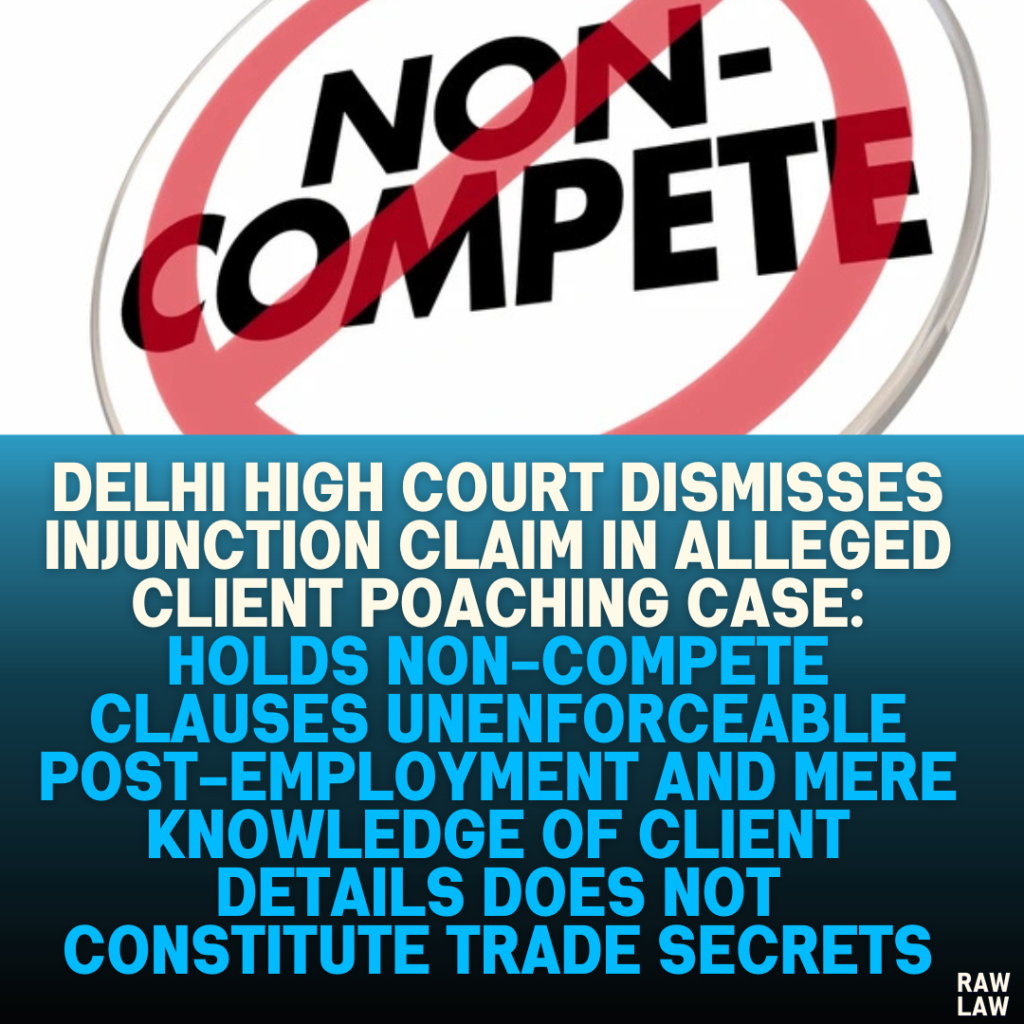Court’s Decision
The Delhi High Court denied the plaintiff’s application for an ad-interim injunction. The plaintiff alleged that its former employees and their newly incorporated companies engaged in unfair practices by misusing client details, inflating bills, and diverting business opportunities. However, the court found no substantial evidence to support these allegations and ruled that the defendants’ actions did not violate confidentiality or constitute a breach of trade secrets.
The court further held that:
- Client lists or operational knowledge obtained during employment cannot automatically be considered confidential or proprietary.
- Restricting employees post-employment without reasonable grounds infringes on their right to livelihood under Section 27 of the Indian Contract Act, 1872.
Facts of the Case
- The Plaintiff’s Background:
The plaintiff, an event management company, had established itself as a reputable service provider for major corporate clients like Oracle, Intel, and HP. Over two decades, it had created goodwill in the market, handling significant corporate events and earning substantial revenues. - Allegations Against the Defendants:
- Four former employees of the plaintiff, including directors, were accused of conspiring to divert business opportunities by forming competing companies during their employment.
- These employees allegedly used the plaintiff’s confidential client information and intellectual property to secure lucrative events for clients.
- The plaintiff cited instances of inflated billing and diversion of high-revenue projects, including one worth ₹30,00,000.
- Relief Sought by the Plaintiff:
The plaintiff sought an interim injunction to:- Restrain the defendants from competing in the same business sector.
- Prevent them from misusing client details and diverting clientele.
Issues for the Court
- Whether the defendants’ use of client details and operational knowledge constitutes a breach of confidentiality.
- Whether the plaintiff is entitled to an injunction based on claims of misuse of proprietary information.
- Are the non-compete clauses enforceable against the defendants under Indian law?
Petitioner’s (Plaintiff’s) Arguments
- Breach of Confidentiality and Non-Compete Agreements:
The defendants had contractual obligations prohibiting the use of client information for competing business activities. - Financial Loss:
The defendants’ actions allegedly caused significant financial harm, as the diverted business included major events managed by the plaintiff. - Irreparable Harm:
The plaintiff argued that its goodwill, built painstakingly over two decades, would be destroyed if the defendants were not restrained. - Unfair Practices:
The defendants used proprietary tools, client databases, and goodwill established by the plaintiff to misrepresent themselves as affiliates or branches of the plaintiff.
Respondent’s (Defendant’s) Arguments
- Fair Competition:
The defendants argued they had left the plaintiff’s employment legitimately to pursue their entrepreneurial interests. They denied any misuse of confidential information. - Public Knowledge:
The client details and operational data cited by the plaintiff were publicly available and not exclusive to the plaintiff. - Unenforceable Non-Compete Clauses:
The non-compete clauses were overly broad and violated Section 27 of the Indian Contract Act, 1872, which prohibits agreements restraining trade. - Lack of Evidence:
The defendants contended that the plaintiff failed to provide sufficient evidence proving harm or misuse of proprietary information.
Court’s Analysis of the Law
1. Legal Principles Governing Injunctions
The court referred to key precedents, including Dalpat Kumar v. Prahlad Singh and Seema Arshad Zaheer v. Municipal Corporation of Greater Mumbai, which set out the conditions for granting injunctions:
- Prima Facie Case: The plaintiff must show that their case has a reasonable chance of success.
- Irreparable Harm: Harm caused must be substantial and cannot be adequately compensated with monetary damages.
- Balance of Convenience: The inconvenience caused to the plaintiff by denying the injunction must outweigh the harm caused to the defendants by granting it.
2. Non-Compete Clauses and Public Policy
- The court emphasized that while non-compete clauses during employment are enforceable, restrictions post-employment must be reasonable and necessary to protect trade secrets.
- Section 27 of the Indian Contract Act invalidates agreements that impose unreasonable restrictions on trade or employment.
3. Confidential Information vs. Public Knowledge
The court noted that information must be truly proprietary to warrant legal protection. Client details publicly available or accessible through minimal effort cannot be deemed confidential or trade secrets. The plaintiff failed to prove that their client lists or operational knowledge met this criterion.
4. Employee Rights
The court underscored that restricting former employees from using their general industry knowledge or pursuing legitimate business activities is contrary to public policy and their right to livelihood.
Precedent Analysis
- American Express Bank Ltd. v. Priya Puri: The court held that general knowledge gained during employment cannot be classified as confidential.
- Manipal Business Solutions Pvt. Ltd. v. Aurigain Consultants Pvt. Ltd.: Client lists must possess distinct commercial value to qualify as confidential information. Publicly accessible details do not meet this standard.
Court’s Reasoning
- The plaintiff could not establish that the defendants’ use of client details caused irreparable harm or that the information constituted trade secrets.
- The non-compete clause was deemed unreasonable and unenforceable post-employment.
- The plaintiff’s claims were speculative, and the evidence provided did not substantiate allegations of client poaching or misuse of proprietary information.
Conclusion
The court dismissed the plaintiff’s application for an ad-interim injunction, stating:
- “The Plaintiff has failed to establish a prima facie case for the grant of an ad-interim injunction under Order XXXIX Rules 1 and 2 of the CPC.”
- There was no evidence of irreparable harm or proprietary information misuse.
Implications
This judgment reinforces the principle that businesses must substantiate claims of confidentiality and irreparable harm to succeed in injunction applications. It highlights the need for reasonable restrictions in non-compete clauses and balances the rights of employees to pursue legitimate trade. The ruling promotes fair competition while protecting businesses from genuine misuse of proprietary information.




Pingback: Bombay High Court Quashes Time-Barred Reassessment Order: "Violation of Limitation Period Under Section 153 Renders Order Void; Procedural Irregularities Highlighted" - Raw Law